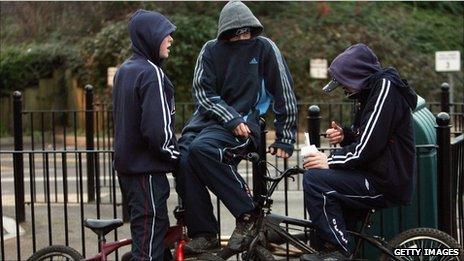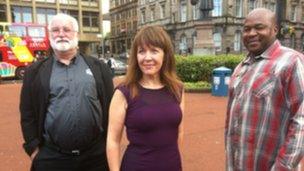'Jobs not jail' scheme for Scotland's gang members
- Published

A Los Angeles scheme to help former gang members find employment could be replicated in Scotland
Leaders from a project that works to divert gang members in Los Angeles away from jail and into jobs are visiting Scotland this week.
Homeboy Industries employs hundreds of ex-inmates and former gang members, and offers courses and counselling to thousands more.
They are holding meetings with a range of organisations with a view to setting up a similar scheme here.
Supporters claim the scheme is more cost effective than locking people up.
But critics have said the initiative risks glorifying gang culture.
The project was founded 25 years ago by the Jesuit priest Father Greg Boyle.
'Light of hope'
He told BBC Radio Scotland: "In Los Angeles, the gang capital of the world, we have 1,100 gangs and 120,000 gang members so it is a daunting, complex social dilemma. But you have to offer an exit ramp off this highway.
"You have to be able to invite them to leave it behind, and it's not enough just to tell them 'just say no' you have to 'just say yes' to them in terms of offering alternatives and possibilities.
"You have to ignite the pilot light of hope that in the end will keep them from reoffending or returning to prison."
The LA project now runs bakeries and diners, market gardens, a silkscreen print workshop and a solar panel installation business.
It also offers thousands of at-risk young people a range of sessions, including anger management and treatment to remove tattoos.
Former gang member James Horton spent 12 years on death row in the US but was later cleared of a murder charge. He now works with Homeboy Industries.
"Joining a gang was like a rite of passage, and you did it because you wanted to be accepted by those in your community," he said.
"I was drug dealer too. I was a criminal. Every opportunity that I had to do something to make some money I was most likely involved in doing that.
"You have to deal with the issue as a whole. You can tell someone 'come join us, be with us' but if you don't give them no hope, or no job, then the gang will always have access to them.
"Father Greg teaches us that you can never take away a person's hope."
Halo effect
Police Scotland's Violence Reduction Unit (VRU) said one of the biggest challenges for ex gang members and those recently out of prison was finding a meaningful job, so they could contribute economically and socially.

Father Greg Boyle and former gang member James Horton are in Glasgow working with the VRU
The VRU said Braveheart Industries, a social enterprise based on the Los Angeles experience, could improve public safety, make communities healthier and safer, and break the cycle of gang violence.
VRU director Karyn McCluskey added: "Giving people an opportunity and a job has a huge impact on their life and it has a halo effect on their family, it affects the lives of their children and their partners, and I think we can use that experience here.
"We've had great policing, Stephen House has driven down violence in Scotland, but the thing that really stops reoffending is giving people a positive destination and I think we can really take some of the experience from Father Greg and Homeboy Industries and use it in Scotland."
Meetings are to be held in Glasgow, with similar sessions planned in Edinburgh and Kilmarnock later in the week, to see if the work can be replicated across Scotland.
The Violence Reduction Unit was founded in January 2005 by Strathclyde Police, to target knife crime. Its remit was extended nationwide just over a year later.
- Published24 April 2013
- Published12 October 2012
- Published12 October 2011
- Published4 July 2011